Volume 2: Universal History (1949)
Six 1-hour lectures, a fragment of the original course

There are several lecture series with this title.
All of them have the same premise as Out of Revolution, in that they seek to express the unity of history. But here Rosenstock-Huessy proclaims more than the unity of the 1,000 years of European history–he argues for the movement of the spirit through the entire history of mankind, “from Adam to the last judgment.” Our own story is told through the lives of our revolutionary ancestors: the tribes, the astrological empires, the Jews, and the Greeks, all of whom are honored not only for their enduring and continuing contributions to that history, but for having once and for all broken new ground.
Rosenstock-Huessy defends both the existence and the meaning of the Christian era. Indeed he names Christ as the turning point of history, the culmination of the yearnings of the ancient world and the redemption of its achievements, as well as the cornerstone of our hopes for the unity of mankind. Like Augustine before him, he sees the four ages of the ancient world succeeded by the millennia of the Christian era, in which one God superseded the many gods, one world was forged out of our competing empires and nations, and one great society is to be born of our many warring social forms. The history of mankind is retold as relay race in which each age or generation enters, claims, and incorporates new territory.
(Much of the material in these courses is available in German, in far greater detail, in the second volume of Soziologie. A translation of that second volume is in preparation.)
